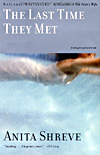
Comment
on this story
|
 |

Where do they go after the last page is read?
by Jeanne McDonald
Southern writer Elizabeth Spencer once said that when she finishes writing a novel or story, she usually doesn't worry about her characters anymore because she believes they go on to live lives of their own.
Characters in great books do live on in our hearts and memories, sometimes for years. But the notion of their going on with their lives after the closing pages is rather like thinking of the author as a god with only limited power. It's an intriguing supposition. Think about what might have happened to Huckleberry Finn as a grown man. What if Aunt Sally did actually "sivilize" him to the point that he became politically correct, and if so, how might he then have referred to Nigger Jim? And what about Madame Bovary's lover, Rodolphe? Might he have lived his later years in guilt for having betrayed Emma?
But what if the writer herself takes away the future lives of the characters from beneath your very nose? Imagine, for example, the frustration—and, in my case, outright anger—when an author writes a beautifully structured book with vibrant characters and then essentially tells you that it never happened? This is exactly what Anita Shreve does in her highly acclaimed book, The Last Time They Met (Back Bay, $13.95). In this hypnotic story, Shreve sets herself a difficult  course: She writes the book in reverse chronological order, relating the compelling love story of two distinguished poets, Linda Fallon and Thomas Janes, who meet only three times in 35 years, when Linda is 52, 26, and 17. Although the lovers seem star-crossed, we are totally unprepared for the fate the author chooses for them. course: She writes the book in reverse chronological order, relating the compelling love story of two distinguished poets, Linda Fallon and Thomas Janes, who meet only three times in 35 years, when Linda is 52, 26, and 17. Although the lovers seem star-crossed, we are totally unprepared for the fate the author chooses for them.
After sweeping us, unsuspecting, through the book, keeping us up late to read just one more segment, involving us so thoroughly in the story that we accept the two characters unconditionally, Shreve ultimately cheats us of the ending we deserve. Even the most astute reader, enmeshed in the unfolding events of the story, might fail to notice the writer's use of the subjunctive, a grammatical form used to express supposition, possibility, or hypothesis.
Looking back through the text, you do of course notice the many subjunctive forms—could, would, might have, should have—with which the author has constructed her story, but not until after the fact do you recognize them as such. Nor do you notice until later that the last segment, where Linda is 17, is written in present tense,�whereas the first two are written in past. The entire construct is reminiscent of a failed love affair in which you are blithely unaware of the subtle foreshadowing of impending disaster. Caught up in the story and all its possibilities, you increasingly become involved with the characters, and although you don't presume to guess the ending, you must suffer the disappointment of the author's decision to tease and disappoint.
Shreve is an affecting and meticulous writer with a style so organic that all the interrelated parts are subtly made into a beautiful and satisfying whole. She is so adept at details and description that she can bring a character alive in only a couple of paragraphs. After Thomas meets Linda unexpectedly in an African market, Shreve writes of him: "He stood on Roland's verandah, a Pimm's in his hand, his chest suffused with a sensation he thought, from no recent recognizable experience, must be joy. A feeling that went all the way to his thighs...And knew himself to be in love. If, indeed, he'd ever not been. Not since a day in 1966 when a girl in a gray skirt and a white blouse had crossed the threshold of a schoolroom...It was as if he'd merely been distracted all these years, or had grown weary of loving only memories. And had...been returned to a rightful state."
Shreve's scenes are glorious as well. When Thomas arranges to visit Linda at her home in Africa, the whole scene opens up as if being painted before our eyes: "Beyond his destination, a purple backdrop advanced, signaling a cataclysmic rain...The sun, behind him, lit up fields of chrysanthemums, vast improbable plains of yellow and mauve, and then, at the end of the road, the white stucco of a cottage, bright geometry against the blackened sky."
Reading this book is a sensual experience, and in many ways a rewarding one, but it seems vastly unfair that we are left bereft at the end of the novel, stranded at a little café in Kenya without a ride home.

February 6, 2003 * Vol. 13, No. 6
© 2003 Metro Pulse
|